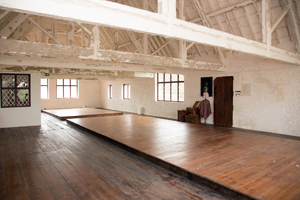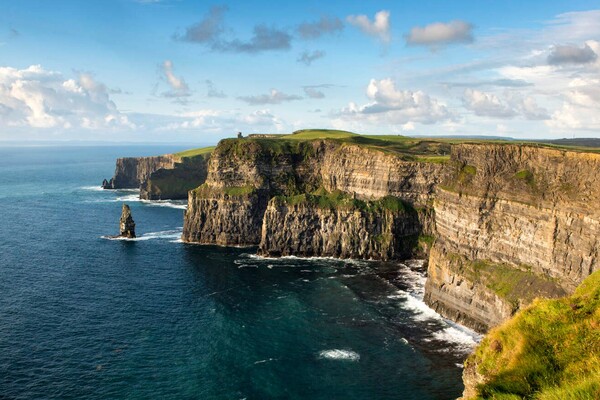Oops... something went wrong!
My Ireland
Looking for inspiration? Planning a trip? Or just want to scroll yourself happy? We'll show you an Ireland that's tailor-made for you.
- #Landscapes
- #CultureandHeritage
- #OutdoorActivities
- #Landmarks


Oops, no internet connection
While offline, you can still add items to ‘My Board’. New travel reccomendations will only show up once you’re back online.
See what Ireland has in store for you
Carrickmacross Workhouse
In the early 1840's, the population of Ireland was almost 9 million - 3 million of whom were destitute, due primarily to evictions by absentee British landlords. Carrickmacross Workhouse was one of 130 Workhouses built between 1841 and 1843 to house these paupers, hence the Irish name of ‘Teach na mBocht’ - The Poorhouse. Successful applicants had to surrender any land before entering as Workhouse ‘inmates’, where they were subjected to a strict regime: families were separated and forbidden from seeing each other without permission; their diet was meagre and unvarying; difficult, and often pointless, work had to be undertaken; there was little heat and no comfort. These deliberately harsh conditions meant that Workhouses quickly became known as the ‘Poor Man’s Jail’, and paupers only applied for admission as their last resort. In 1520, Catholics, both Irish and Anglo-Norman, owned 100% of the land. However, after 3 centuries of plantations, confiscations, evictions, Penal Laws and colonialism, approximately 90% of the land belonged to British Protestant landlords, with the Catholics as their tenants. As tenants, they produced massive quantities of agricultural produce and livestock, which they had to sell to pay their rent, or face eviction. This left the majority of the native population solely dependent on potatoes for food, as they were cheap to purchase, could be grown in small plots of poor soil, and were high in nutrition. Then, for 4 consecutive years, 1845 to 1848, blight destroyed the potato harvest across Europe. The British Government sent approximately 20,000 additional troops to Ireland to ensure people did not eat the thousands of tonnes of other crops and animals being exported by landlords for profit. This resulted in The Great Hunger, ‘An Gorta Mór’, and the poor begged for admission to the Workhouses. Carrickmacross Workhouse was built to house 500, however by 1851, nearly 2,000 men, women and children were crammed into the building. Due to the large numbers of children in Workhouses orphaned by The Great Hunger, the English Government’s Secretary of State for the Colonies, Earl Grey, devised the ‘Pauper’s Emigration Scheme’. Under this scheme, over 4,000 Irish orphan girls between the ages of 14 and 18 were emigrated to Australia, and other British colonies, as wives and servants of the settlers and convicts there. Through our research, we have discovered the names 19 of the 38 orphan girls who travelled to Australia, from Carrickmacross Workhouse. Death and emigration, whether voluntary or forced, gradually reduced numbers in the Workhouses until only the destitute, sick and elderly remained. At their first meeting on 21st January 1919, the newly formed Dáil Éireann ‘abolished the odious, degrading and foreign Workhouse System’. ‘An Gorta Mór’, The Great Hunger, proved a watershed in Irish history, permanently changing our island’s demographic, political and cultural landscape. Within 20 years, 1841 to 1861,
attractions

Oops, no internet connection
While offline, you can still add items to ‘My Board’. New travel reccomendations will only show up once you’re back online.
Looks like your board is empty
Look out for the little heart icon around Ireland.com, simply tap the icon to start adding items to your board!


Sign up Not got an account?
Login Got an account?
Location access
- View offers and deals nearby you
- Get travel inspiration based on your location
- Local weather warnings and useful travel information
Notifications
Travel times
Tell us when you are going to be travelling Ireland, and we will show you tailored recommendations for the duration of your trip.


- Tips for events happening during your stay
- Helpful travel reminders and updates
Privacy
We take your privacy very serious and only ever process your data with your persmission. If possible this is handled anonymously and we will never store your data for longer than is required. For more information on how we handle your personal data please read our Privacy Policy.
Remove Data
To securely remove all data associated with your profile please contact our Data Protection Officer.
Reset your Board
This will remove all the items you have previously liked from your board. Please note, you can’t undo this action.
- Created date 06 February 2025
Privacy
We take your privacy very serious and only ever process your data with your persmission. If possible this is handled anonymously and we will never store your data for longer than is required. For more information on how we handle your personal data please read our Privacy Policy.
Delete account
Sorry you’re leaving. But you gotta do what you gotta do. Just a reminder, if you delete your account, you won’t be able to post in Community. And it’s permanent so you can’t “undo” it in the future.
Location access
- View offers and deals nearby you
- Get travel inspiration based on your location
- Local weather warnings and useful travel information
Notifications
Travel times
Tell us when you are going to be travelling Ireland, and we will show you tailored recommendations for the duration of your trip.


- Tips for events happening during your stay
- Helpful travel reminders and updates
Reset your Board
This will remove all the items you have previously liked from your board. Please note, you can’t undo this action.










